Small Users in Big Cities (No. 15).
Page 6
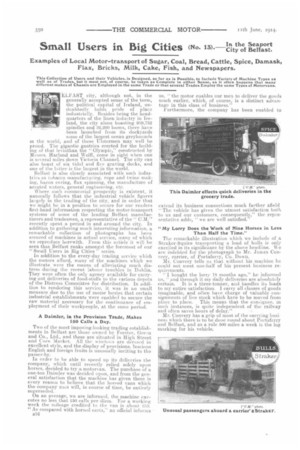
Page 8
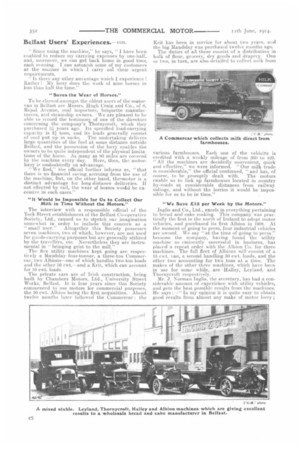
Page 9
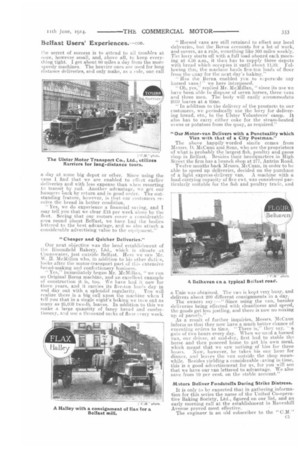
Page 10
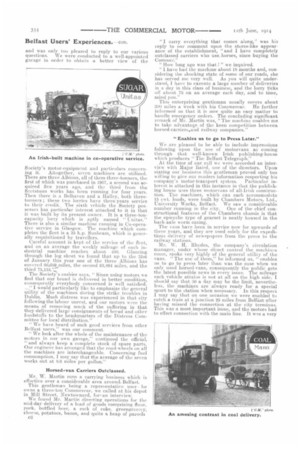
Page 11
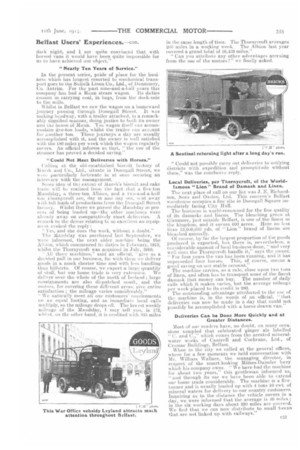
If you've noticed an error in this article please click here to report it so we can fix it.
In the Seaport City of Belfast.
Examples of Local Motor-transport of Sugar, Coal, Bread, Cattle, Spice, Damask, Flax, Bricks, Milk, Cake, Fish, and Newspapers.
This Collection of Users and their Vehicles, is Designed, so far as is Possible, to Include Variety of Machine Types as well as of Trades, but it must not, of course, be taken as Complete in either Sense, as it often happens that many different makes of Chassis are Employed in the same Trade or that several Trades Employ the same Types of Motorvans.
ELFAST city, although not, in the generally accepted sense of the term, the political capital of Ireland, undoubtedly holds pride of place industrially. Besides being the headquarters of the linen industry in Ireland, the city alone boasting 939,732 spindles and 36,200 looms, there have been launched from its dockyards some of the largestocean greyhounds in the world, and of these Ulstermen may well be proud. The gigantic gantries erected for the building of that leviathan the " Olympic," constructed by Messrs. Harland and Wolff, come in sight when one is several miles down Victoria Channel. The city can also boast of six tidal and five graving docks, and one of the latter is the largest in tile world.
Belfast is also closely associated with' such industries As tobacco manufactusing, rope and twine making, bacon curing, flax spinning, the manufacture of aerated waters, general engineering, etc. Where such commercial prosperity is existent, it naturally follows that the industrial vehicle figures largely in the trading of the city, and in order that we might be in a position to secure for our readers first-hand information respecting the motor-transport systems of some of the leading Belfast manufacturers and tradesmen, a representative of the " CM." recently spent a period in and around the city. In addition to gathering much interesting information, a remarkable collection of photographs has been secured of machines in actual service, .many of which we reproduce herewith. From this article it will be seen that Belfast ranks amongst the foremost of our " Small Users in Big Cities " series. In addition to the every-day trading service which the motors afford, many of the machines which wo illustrate were the means of alleviating much distress during the recent labour troubles in Dublin. They were often the only agency available for carrying out deliveries of food-stuffs to the various depots of the Distress Committee for distribution. In addition to rendering tins service, it was in no small measure due to the use of motor lorries that ceitain industrial establishments were enabled to secure the raw material necessary for the continuance of employment of their workpeople, at the same period.
A Daimler, in the Provision Trade, Makes 150 Calls a Day.
Two of the most imposing-looking trading establishments in Belfast are those owned by Forster, Green and Co., Ltd., and these are situated in High Street and Corn Market. All the windows are clressed in excellent style, and the display of provisions, luscious English and foreign fruits is unusually inviting to the passer-by.
In order to be able to speed up its deliveries the company, which until recently relied solely upon horses, decided to try a motorvan. The purchase of a one-ton Daimler was decided upon, and from the general satisfaction that the machine has given there is every reason to believe that the horsed vans which the company uses will, in course of time, be entirely superseded.
On an average, we are informed, the machine executes no less that 150 calls per diem. For a working week the mileage credited to the van is about t2rio. "As compared with horsed carts," an official informs
us, "the motor enables our men to deliver the goods much earlier, which, of course; is a distinct advantage in this class of business."
Furthermore, the company has been enabled to extend its business connections much farther afield " The vehicle has given the utmost satisfaction both to us and our customers, consequently," the representative adds, " we are well satisfied."
"My Lorry Does the Work of Nine Horses in Less Than Half the Time."
The remarkable illustration which we include of a Straker-Squire transporting a load of bulls is only excelled in its significance by the above headline. We ate indebted for the photograph to M.r. James Convery, carrier, of Portaferry, Co. Down. Mr. Convery tells us that without his machine he could not meet one-half of his present business requirements.
" I bought the lorry 18 months ago," he informed us, "and through it my daily deliveries are absolutely certain. It is a three-tonner, and handles its loath to my entire satisfaction. I carry all classes of goods imaginable, and often have charge of valuable consignments of live stock which have to be moved from place to place. This means that the consignee, in such instances, is quite independent of the railway and often saves hours of delay."
Mr. Convery has a grip of most of the carrying busi• ness which there is to be done round about Portaferry and Belfast, and as a rule 500 miles a week is the log marking for his vehicle.
Si ice using the imichi-ne," he says, "I have been enabled to reduce my carrying expenses by one-half, and, moreover, we can get back home in good time each evening. I can astonish some of my customers at the manner in which I carry out their urgent requ irements.
" Is there any other aavantage wnich I experience Rather My lorry does the work of nine horses in loss than half the time."
"Saves the Wear of Horses."
To be class.ed amongst the oldest users of the motorvan in Belfast are Messrs, Hugh Craig and Co., of 6, Royal Avenue, coal importers, briquette manufacturers, and steamship owners. We are pleased to be able to record the testimony of one of the directors concerning the company's Thornyeroft-, which they purchased 31 years ago. Its specified load-carrying capacity is 21 tons, and its loads generally consist of coal put up in sacks. The undertaking delivers large quantities of the fuel at some distance outside Belfast, and the possession of the lorry enables the owners to be quite independent of the physical limitations of the horse. As many as SO miles are covered by the machine every day. Here, then, the motorlorry is undoubtedly an advantage.
" We find," the official further informs us, " that there is no financial saving, accruing from the use of the machine, fret, on the other hand, the+motor is a distinct advantage. for long distance deliveries. If not effected by rail, the wear of horses wooild be excessive in such eases."
"It Would be Impossible For Us to Collect Our Mtik in Time Without the Motors."
The interview with a responsible official of the York Street establishment of the Belfast Co-operative Society, Ltd., caused us to stretch our imagination somewhat, in order to include this conceal as a " small user." Altogether this Society possesses seven machines, two of which, however, are not used for goods-carrying purposes but are generally utilized by the travellers, etc. Nevertheless they are instrumental in "bringing grist to the mill." The five utility machines kept going are respectively a Maudslay feur-tonner, a three-ton Commerear, two Albion—one of which handles two-ton loads and the other 30 cwt.—and a Krit, which can account for 10 cwt. loads.
The private cars are of Trish construction, being built by Chambers Motors, Ltd., University Street Works, Belfast. It is sour years since this Society commenced to use motors tor commercial purposes, the 30 cwt. Albion being the first acquisition. About twelve months later followed the Commercar : the Krit has been in service for about two years, and the big Maudslay was pun:based twelve months ago. The duties of aii these consist of a distribution in bulk of flour, grocery; dry goods and drapery. One or two, in turn, are also detaile.d to collect milk from various farmhouses. Each one of the vellieltz is credited with a weekly mileage of from 300 to 420. All the machines are decidedly convenient, quick and effective," we were informed. "Our milk trade is considerable," the official continued, "and has, of course, to be promptly dealt with. The motors enable us to link up farmhouses located in country by-roads at considerable distances from railway sidings, and without the lorries it would be impossible for its to be in time."
"We Save 115 per Week by the Motors."
Inglis and Co., Ltd., excels in everything pertaining to bread and cake making. This company was practically the first in the north of Ireland to adopt motor vehicles, and purchased its first Albion in 1908. At the moment of going to press, four industrial vehicles are owned. We say " at the time of going to press" because the company, having found the utility machine so eminently successful in business, has placed a repeat order with the Albion Co. for three machines. The full fleet of Albions will consist of a 15 cwt. van, a second handling. 30 cwt. loads, and the other two accounting for two tons at a time, The makes of the other three machines, which have been in use for some while, . are-Halley, Leyland, and Thornyer•oft respectively. . • • Mr. J. Norman Inglis, the..secretary, has had a c•onsiderable amount of experience with utility vehicles, and gets the best possible results from the machines. He says In my opinion it is quite easy to obtain good results from almost any make of motor lorry ; the secret of success is to attend to all troubles at once, however small, and, above all, to keep everything tight. I get about 80 miles a day from the more speedy machines. The heavier ones are used for long distance deliveries, and only make, as a rule, one call
a day at some big depot or other. Since using the vans I find that we are enabled to effect earlier deliveries and with less expense than w hen resorting to transit by rail. Another advantage, we get our hampers track by return and iii good order'. The outstanding feature, however, is that Our customers receive the bread in better condition.
"Yes, we do experience a financial saving, and I may tell you that we, clear 15 per week alone by the fleet. Seeing that our motors cover a considerable area round about Belfast, we have had the bodice lettered to the best advantage, and so also attach a considerable advertising value to the ereiipment."
"Cheaper and Quicker Deliveries."
Our next objective was the head establiehment of the Bloomfield Bakery, Ltd., which is situate at Connswater, just outside Belfast. Here we saw Mr. W. H. McMillan who, in addition to his other duties, looks after the motor-transport part el this extensive bread-making and confectionery business.
" Yes," immediately began Mr. McMillan, "WO ran an Original Berne machine, and an excellent example of construction it is, too. We have had it now for three years, and it carries its five-ton loads day in
and day out with a splendid regularity. You will realize there is a big call upon the maehine when I tell you that in a single night's baking we turn out as many as 25,030 two-lb. loaves. In addition to this we make a large quantity of fancy bread and confectioneiy, and use a thousand sacks of flour every week. "Horsed vans are still retained to effect our local deliveries, but the Berea accounts for a lot of work, and covers, as a rule, something like 300 miles weekly. The lorry starts off with a full load aboard each morning at 4.30 a.m., it then has to supply three depots with bread which occupies it until about 11.30. Following this, the machine hauls five-ten loads of flour from the euay for the next day's baking."
" Has the Berne, enabled you to supersede any horsed vans ?" we here interposed.
Oh, yes," replied Mr. McMillan, " since its use we have been able to dispose of seven horses, three vans and three men. The body will easily accommodate 2000 loaves at a time.
" In addition to the delivery of the products to our customers, we perioehcally use the lorry for delivering bread, etc., to the Ulster Volunteers camp. It also has to carry either coke for the steam-heated ovens or potatoes from the quay, as required."
"Our Motor-van Delivers with a Punctuality which Vies with that of a City Postman."
The above happily worded simile comes from Messrs. a McCann and Sons, who are the proprietors of what is probably the largestfish, poultry and game shop in Belfast. Besides their headquarters in High Street the firm has a branch shop at 277, Antrim Road.
Twelve months back Messrs. McCann, in order to be able to .speed up deliveries, decided on the purchase of a light express-delivery van. A machine with a load-carrying capacity of five cwt. was considered particularly suitable for the fish and poultry trade, and a Unic was obtained. The van is kept very busy, and delivers about 200 different consignments in a day.
The owners say'.—" Since using the van, besides deliveries being effected with cleanliness and speed, the goods get less jostling, and there-is now no mixing -up of parcels." As a result of further inquiries, Messrs. McCann inform us that they now have a much better chance of executing orders to time. " There is," they say, gain of two hours every day. When weaused a horsed van, oar driver, at mid-day, first had to stable the horse and then peoceed home to get his own meal, which meant that we saw nothing of him for three hums. Now, however, he takes his one hour for dinner, and leaves the van outside the shop meanwhile. Besides yielding a considerable eaving in time, this is a good advertisement for us, for you will see that we have our van lettered to advantage. We also rave from 10 per cent, on the stable account."
Motors Deliver Foodstuffs During Strike Distress.
It is only to be expected that in gathering information for this series the name of the United Co-operative Baking Society, Ltd., figured on our list, and an early morning call at the establishment in Ravenhill Avenue proved most effective. The engineer is an old subscriber to the " CS and was only too pleased to reply to our various questions. We were conducted to a well-appointed garage in order to obtain a better view of the
Society's motor-cquipnwnt and particulars concern ing it. Altogether, seven machines are utilized. There are three Albions, all of them three-tonners, the first of which was purchased in 1907, a second was acquired five years ago, and the third from the Scotstoun works has been running for four years. Then there is a Belhaven and a Halley, both threethrillers ; these two lorries have three-years service to their credit. The sixth vehicle the Society possesses has particular interest attached to it in that it was built by its present owner. It is a three-toncapacity lorry which is aptly named " Unitas." There is also a similar machine running in Co-operative service in Glasgow. The machine which completes the fleet is a 35 h.p. Sunbeam, which is generally requisitioned by travellers.
Careful account is kept of the service of the fleet, and on an average the weekly mileage of each industrial machine reaches about 400. Glancing through the log sheet we found that up to the 31st of January this year one of the three Albions has covered 66,689,rni1es, the second 63,894 miles, and the third 75,134.'* The Society's cashier says, " Since using motors we find that our bread is delivered in better condition consequently everybody concerned is well satisfied: ea" I would particularly like to emphasize the general utility of the machines during the strike troubles in Dublin. Much distress was experienced in that city following the labour unrest, and our motors were the means of removing much of the suffering in that they delivered large consignments of bread and other foodstuffs to the headquarters of the Distress Committee for local distribution."
" We have heard of such good services from other Belfast users," was our comment.
"We look after the whole of the maintenance of the motors in our own gasage," continued the official, "and always keep a complete stock of spare parts. Our engineer has arranged that the road-wheels on all the machines are interchangeable. Concerning fuel consumption, I may say that the average of the seven works out at 8.6 miles per gallon."
Horsed-van Carriers Outclassed.
Mr. W. Martin runs a carrying business which is effective over a considerable area. around, Belfast.
This gentleman being a representative user— he owns a three-ton Commercar, we called at his depot in Mill Street. Newtownard, for an interview. We found Mr. Martin directing operations for the mid-day delivery of a load of goods comprising flour, pork, bottled beer, a sack of coke, greengrecery, cheese, potatoes, bacon, and quite a heap of parcels ea "I carry everything that comes along," was his reply to our comment upon the stores-like appearance of the establishment, "and I have completely outclassed carriers who use.horses, since buying the (Jammer."
"How long ago was that " we inquired.
"1 have had the machine about 18 months and, considering the shocking state of some of our roads, she has served me very well. As you will quite understand, I have to execute a large number of deliveries in a day in this class of business, and the lorry ticks off about 75 on an average each day, and to time, mind you." This enterprising gentleman usually covers about 300 miles a week with his Commercar. He further informed us that. it is now quite an easy matter to handle emergency orders. The concluding significant remark of Mr. Martin was, "The machine enables me to take advantage of the keen competition between horsed-carriersaand railway companies."
"Enables us to go to Press Later."
We are pleased to be able to include impressions following upon the use of motorvans as coming through that well-known Irish publishing-house which produces "The Belfast Telegraph."
At the time of our call we were accorded an interview with Major Baird, one of the directors. Upon stating our .business this gentleman proved only too willing to give our readers information respecting his company's motor-transport system. Particular interest is attached in this instance in that the publishing house uses three motorvans of all-Irish const:ruetion. The machines, which can each accommodate 15 cwt. loads, were built by Chambers Motors, lad., University Works, Belfast. We saw a considerable number running in the city. One of the chief constructional features of the Chambers chassis is that the epicyclic type of gearset is neatly housed in the back-axle worm casing. i
The vans have been n service now for upwards of three years, and they are used solely for the expeditious -delivery of newspapers from the press to the railway stations.
Mr. W. H. Rhcdes, the company's circulation manager, under whose direct control the machines come, spoke very highly of the general utility of the vans. " The use of them," lie informed us, " enables us to go to press later than was the ease when we only used horsed-vans, consequently the public gets the latest possible news in every issue. The mileage each vehicle attains is not at all on the high side. I should say that 30 a day may be the limit, nevertheless, the machines are always ready for a special spurt to the station when necessary. In this respect I may say that on one occasion we were enabled to catch a train at a junction 25miles from Belfast after having missed the connection at the city terminus. This was a. most important issue, and the motors had to effect connection with the main line. It was a very
dark night, and i am quite convinted that with horsed vans it would have been quite impossible for us to have achieved our object."
"Nearly Ten Years of Service."
In the present series, pride of place for the business which has longest resorted to mechanical transport goes to the Suffolk Linen Co., Ltd., of Dunmurry, Co. Antrim. For the past nine-and-a-half years this company has had a Mann steam wagon.. Its duties consist in carrying coal, in bags, from the dock-side to the mills.
Whilst in Belfast we saw the wagon on a homeward journey passing through Donegall Street. It was making headway, with a trailer attached, in a remarkably dignified .inanner, doing justice to both its owner and the house of Mann. The wagon itself can accommodate iive-ton loads, whilst the trailer can aceount for another ton. Three journeys a day are usually accomplished with it, and the owner is well satisfied with the 180 miles per week which the wagon regularly covers. An official informs its that, " the use of the steamer has proved a decided saving.'
"Could Not Meet Deliveries with Horses."
Calling at the old-established biscuit factory ot Marsh and Co., Ltd., situate in Donegall Street, we e me particularly fortunate in at once securing an interview with the management.
Some idea ol the extent of Marsh's biscuit and cake trade will be realized from the fact that a five-ton Maudslay, a three-ton Albion, and a two-and-a-half ton ehornycroft are, day in and day out, sent away midi hill loads of productions from the Deleigall Street factory. Whilst there we passed the Maudslay in process of being loaded up—the other machines were already away on comparatively short deliveries. A remark to the driver relating to so excellent an equip»i cril. evoked the reply " Yes, and she does the work, without a doubt."
The Maudslay was purchased last September, we were informed, the ile.xt older macihinc being the
which commenced its duties in February, 1913, whilst the Thornycroft was acquired in July, 1910.
" All three machines," said an official, '' give us a decided pull in our business, for with them we deliver goods in a much shorter time and with less handling than hitherto. Of course, we export a large quantity of stuff, but our home trade is very extensive. 'We deliver over the whole of the north of Trebled ; large consignments are also dispatched south, and the motors, for covering these different areas, give entire satisfaction ; the mileage varies considerably."
"W e naturally meet all our customers' reeuivements on an equal footing, and as immediate local calls multiply, so the mileage drops off. The lowest weekly mileage. of the Maudslay, I may tell you, is 172, whest, on the other hand, it is credited with :i65 mike in lie same length of time. The Thornyeroft averages 200 miles in a working week. The Albion last year covered a grand total of 16,439 miles."
" Can you attribute any other advantages accruing from the use of the motors 2" we finally asked.
" Could not possibly carry out deliveries to outlying districts with expedition and promptitude without them," was the conclusive reply.
Local Deliveries, per Thornycroft, of the Worldfamous " Lion " Brand of Damask and Linen.
Th next place of call on our list was J. N. Richardson, Sons and Owden, Ltd. This concern's Belfast warehouse occupies a fine site in Donegall Square im
mediately facing City Hall.
The business is world-renowned for the fine quality of its damasks and linens. The bleaching greee at Glenmore, just outside Belfast, is one of the finest in the kingdom, and it covers 600 acres. Here no less than 12,000,000 yds. of "Lion" brand of linens are
bleached annually.
Of course, by far the hugest proportion of the goods produced is exported, but there is, nevertheless, a considerable amount of local business done, " and very well does the Thornycroft handle it," says the owner. " For four years the van has been running, and it has supei eeded four horses. This, of course, means a
great saving on omestable account" The machine carries, ns a rule, close upon two tons of linen, and often has to transport some of the finest damask that money can buy. The number of, daily calls which it makes varies, but the average mileage per week placed to its credit is 280. The outstanding advantage attributed to the use of the machine is, in the words of an official, 'that deliveries can now be made in a day that could not possibly be accomplished with a horse drawn van."
Deliveries Can be Done More Quickly and at Greater Distances.
Most of our readers have, no doubt, on many occa sions sampled that celebrated ginger ale labelled "C. arid C.," which comes from the aerated mineral water works of Cantrell and Cochrane, Ltd., of Cromae Buildings, Belfast.. When in the city we called at the general offices, where for a few moments we held conversation with Mr. William Wallace, the managing director, in respect of the smart-looking Miines-Daimler lorry which his company owns. "We have had the machine for about two years," this gentleman informed us, "and through its use we have been able to extend our home trade considerably. The machine is a fivetonner and is usually loaded up with 4 tons 10 cwt. of mineral waters for delivery to our country customers. Inquiring mis to the distance the vehicle covers in a day, we were informed that the average is 40 miles ; in the six working days about 220 miles are covered. We find that we can now distribute to small towns that are not linked up with railways."

























